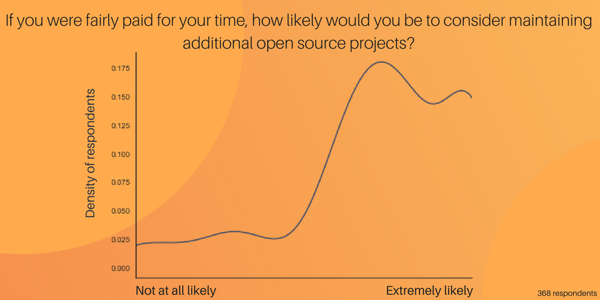Earlier this year, we launched our first professional open source survey. Our goal? To gain deeper perspective about what can be done to make open source—especially as it is used in professional settings—work better for everyone. We wanted to understand what professional users of open source look like and what matters to them. And we wanted to understand the needs, problems, and passions of those who create and maintain the software they use.

Our hope was that we could find some common ground, a win-win for both those who use and maintain open source software.
We received over 1,200 responses, and now we’re sharing our key findings and more details about our dataset. In our last post, we discovered that it is rather difficult for open source maintainers to find time to work on their projects, especially for those whose projects do not have external funding.
This finding begged the question: would better financial support make it easier for maintainers to work on open source? And would they be interested in working on more projects if they were paid well?
Insight 7: if they were well paid, open source maintainers would want to spend more time working on more projects
The first question we asked maintainers was simple: suppose you were fairly paid for your time, how many hours would you want to work each week on open source projects?
Our respondents showed a strong interest in spending significant time working on open source software. Assuming they were fairly paid, nearly 50% of respondents said they would be willing to work over 21 hours per week.
.png?width=600&name=How%20much%20would%20maintainers%20work%20if%20fairly%20paid%20(1).png)
Almost every single respondent—over 98%—said that they would work on open source if fairly paid. 30% would work 21-40 hours per week, and 17% even said they’d be willing to work more than 40 hours per week. What’s more, 86% of the 396 respondents said that they would work at least an hour per day on open source if paid fairly.
While this data is interesting, one could say it’s to be expected that open source developers would want to spend more time working on their projects if they were well compensated. But the next data point turns out to be even more interesting.
Not only do the respondents want to spend more time working on open source, but they would also be highly likely to maintain more projects if they were paid for their time:

This is a fascinating finding, as it sheds some light on the incentives around open source: maintainers are not exclusively interested in working on their individual projects, and financial support seems to be a primary factor blocking them from doing even more open source work (if not the primary factor).
With this discovery, it would appear that there is a supply of open source maintainers who could meet the demand of professional open source users for more dependable support and maintenance around their software.
Which brings us to our next question: are maintainers interested in doing the same work that professional users have told us they are willing to pay for?
We’ll dive into this in our next post! In the meantime, let us know if you’d like to receive updates, and follow us on Twitter.



 50 Milk St, 16th Floor, Boston, MA 02109
50 Milk St, 16th Floor, Boston, MA 02109